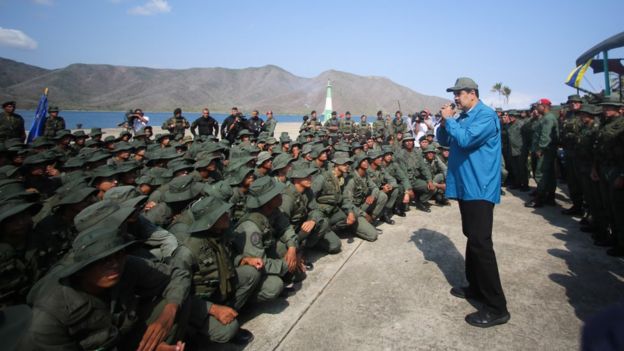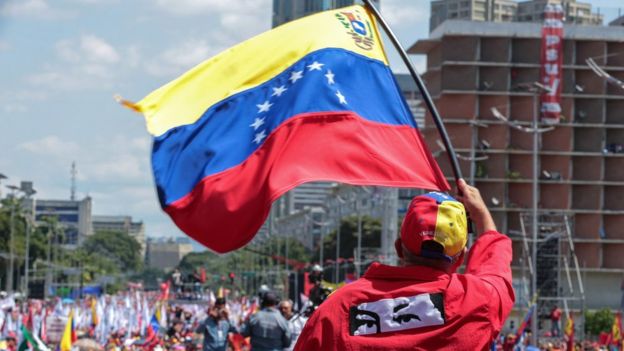
The UK, France, Germany, Spain and other European countries have officially recognised opposition leader Juan Guaidó as interim president of Venezuela.
It comes after President Nicolás Maduro defiantly rejected the EU's Sunday deadline to call snap elections.
Mr Guaidó declared himself interim leader last month and won US backing.
Russia - a backer of Mr Maduro - accused EU countries of meddling in Venezuela's affairs.
As pressure mounted on Mr Maduro to step down, he said he could not rule out the possibility of civil war.
In a TV interview, he warned that US President Donald Trump would leave the White House "stained with blood" if he intervened militarily in the crisis, which has arisen over the legitimacy of his re-election last year.
Mr Guaidó said on Sunday he would build an international coalition to deliver humanitarian aid to Venezuelans.
As head of Venezuela's National Assembly, Mr Guaidó says the constitution allows him to assume power temporarily when the president is deemed illegitimate.
Sunday saw the expiry of an ultimatum set by European countries including France, the UK, Germany and Spain for Mr Maduro to call early presidential elections. They said that they would recognise Mr Guaidó as interim president if no such pledge was forthcoming.
On Monday, those countries and and several other European nations officially recognised Mr Guaidó as interim president.
"UK alongside European allies now recognises @jguaido as interim constitutional president until credible elections can be held", Foreign Secretary Jeremy Hunt said in a statement on Twitter.
UK Prime Minister Theresa May's official spokesman said that "further steps" were being considered, including the use of sanctions, without outlining what form any possible sanctions might take.
French President Emmanuel Macron said Venezuelans had the right to "express themselves freely and democratically", announcing his support for an EU contact group.
German Chancellor Angela Merkel told a news conference in Tokyo that EU countries expected Mr Guaidó to initiate a swift election process.
Spain's Prime Minister Pedro Sanchez said Venezuela "should be the author of its own destiny."
"The international community has a duty to help and ensure that this happens with the necessary guarantees", he told reporters.

Nicolás Maduro has retained the support of the Venezuelan military
Other EU countries, such as Greece, have publicly backed Mr Maduro. The Greek government reluctantly signed an EU statement in January calling for fresh elections.
The country's left-wing ruling Syriza party then issued its own statement expressing support for "the legitimate President of Venezuela, Nicolas Maduro" .
The Italian government - anti-establishment Five Star Movement and right-wing League - is divided on the issue,
Russia has slammed Monday's statements, accusing EU countries of interfering in Venezuela's affairs and attempting to "legitimise usurped power".
Mr Maduro responded to the EU's deadline saying: "We don't accept ultimatums from anyone. It's like if I told the European Union: 'I give you seven days to recognise the Republic of Catalonia, and if you don't, we are going to take measures.'
"No, international politics can't be based on ultimatums. That was the era of empires and colonies."
In an interview with Spanish television programme Salvados broadcast on Sunday, Mr Maduro was asked if the crisis in Venezuela could result in civil war.
"Today no-one could answer that question with certainty," he said.
"Everything depends on the level of madness and aggressiveness of the northern empire [the US] and its Western allies.
"We ask that nobody intervenes in our internal affairs... and we prepare ourselves to defend our country."
President Trump has told US broadcaster CBS the use of military force remains "an option".
But Mr Maduro warned the US leader he risked a repeat of the Vietnam War - in which the US was involved from 1965 to 1973 - if he intervened.
Hundreds of thousands of US soldiers were sent to help fight communist forces in a costly and unsuccessful war which brought domestic civil unrest and international embarrassment.
"Stop. Stop. Donald Trump! You are making mistakes that are going to stain your hands with blood and you are going to leave the presidency stained with blood," he said.
"Let's respect each other, or is it that you are going to repeat a Vietnam in Latin America?"

Rival protests took place on the streets of Caracas on Saturday
Mr Maduro, who took office in 2013 after the death of Hugo Chavez, has been condemned for alleged human rights abuses and for his handling of the economy.
There are severe shortages of basic items such as medicine and food, and an estimated three million people have fled the country.
The annual inflation rate reached 1,300,000% in the 12 months to November 2018, according to a study by the National Assembly.
By the end of 2018, prices were doubling every 19 days on average.
The price of a cup of coffee in the capital Caracas doubled to 400 bolivars ($0.62; £0.50) in the space of just a week last December, according to Bloomberg.
Many people have been voting with their feet and leaving Venezuela. According to United Nations figures, three million Venezuelans have left the country since 2014 when the economic crisis started to bite.